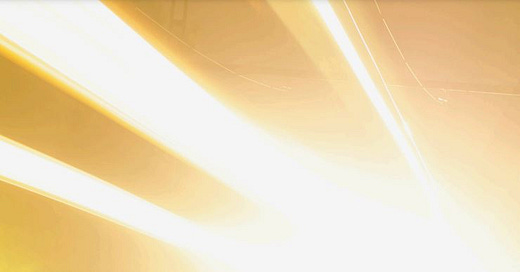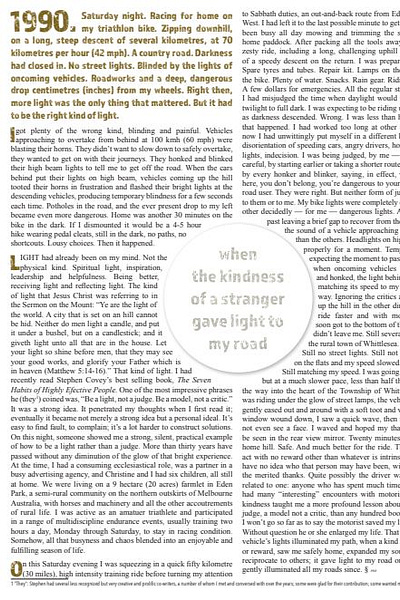1990. Saturday night. Racing for home on my triathlon bike. Zipping downhill, on a long, steep descent of several kilometres, at 70 kilometres per hour (42 mph). A country road. Darkness had closed in. No street lights. Blinded by the lights of oncoming vehicles. Roadworks and a deep, dangerous drop centimetres (inches) from my wheels. Right then, more light was the only thing that mattered. But it had to be the right kind of light.
I got plenty of the wrong kind, blinding and painful. Vehicles approaching to overtake from behind at 100 kmh (60 mph) were blasting their horns. They didn’t want to slow down to safely overtake, they wanted to get on with their journeys. They honked and blinked their high beam lights to tell me to get off the road. When the cars behind put their lights on high beam, vehicles coming up the hill tooted their horns in frustration and flashed their bright lights at the descending vehicles, producing temporary blindness for a few seconds each time. Potholes in the road, and the ever present drop to my left became even more dangerous. Home was another 30 minutes on the bike in the dark. If I dismounted it would be a 4-5 hour hike wearing pedal cleats, still in the dark, no paths, no shortcuts. Lousy choices. Then it happened.
LIGHT had already been on my mind. Not the physical kind. Spiritual light, inspiration, leadership and helpfulness. Being better, receiving light and reflecting light. The kind of light that Jesus Christ was referring to in the Sermon on the Mount: “Ye are the light of the world. A city that is set on an hill cannot be hid. Neither do men light a candle, and put it under a bushel, but on a candlestick; and it giveth light unto all that are in the house. Let your light so shine before men, that they may see your good works, and glorify your Father which is in heaven (Matthew 5:14-16).” That kind of light. I had recently read Stephen Covey’s best selling book, The Seven Habits of Highly Effective People. One of the most impressive phrases he (they) coined was, “Be a light, not a judge. Be a model, not a critic.” It was a strong idea. It penetrated my thoughts when I first read it; eventually it became not merely a strong idea but a personal ideal. It’s easy to find fault, to complain; it’s a lot harder to construct solutions. On this night, someone showed me a strong, silent, practical example of how to be a light rather than a judge. More than thirty years have passed without any diminution of the glow of that bright experience. At the time, I had a consuming ecclesiastical role, was a partner in a busy advertising agency, and Christine and I had six children, all still at home. We were living on a 9 hectare (20 acres) farmlet in Eden Park, a semi-rural community on the northern outskirts of Melbourne Australia, with horses and machinery and all the other accoutrements of rural life. I was active as an amateur triathlete and participated in a range of multidiscipline endurance events, usually training two hours a day, Monday through Saturday, to stay in racing condition. Somehow, all that busyness and chaos blended into an enjoyable and fulfilling season of life.
On this Saturday evening I was squeezing in a quick fifty kilometre (30 miles), high intensity training ride before turning my attention to Sabbath duties, an out-and-back route from Eden Park to Kinglake West. I had left it to the last possible minute to get on my bike. Having been busy all day mowing and trimming the several acres in our home paddock. After packing all the tools away I was ready for a zesty ride, including a long, challenging uphill section and the joy of a speedy descent on the return. I was prepared. Fit and healthy. Spare tyres and tubes. Repair kit. Lamps on the front and back of the bike. Plenty of water. Snacks. Rain gear. Riding glasses. Helmet. A few dollars for emergencies. All the regular stuff. Ready. Go. But I had misjudged the time when daylight would turn to twilight and twilight to full dark. I was expecting to be riding up the home hill just as darkness descended. Wrong. I was less than halfway home when that happened. I had worked too long at other things that day and now I had unwittingly put myself in a different kind of twilight: the disorientation of speeding cars, angry drivers, horns, bright, blinding lights, indecision. I was being judged, by me — why wasn’t I more careful, by starting earlier or taking a shorter route; I was being judged by every honker and blinker, saying, in effect, what are you doing here, you don’t belong, you’re dangerous to yourself and every other road user. They were right. But neither form of judgment was helpful to them or to me. My bike lights were completely defeated by all these other decidedly — for me — dangerous lights. Another car whizzed past leaving a brief gap to recover from the glare. Then I heard the sound of a vehicle approaching from behind, closer than the others. Headlights on high beam. I could see properly for a moment. Temporary relief. I was expecting the moment to pass, but it didn’t. Even when oncoming vehicles blinked their lights and honked, the light behind me stayed steady, matching its speed to my speed. Lighting my way. Ignoring the critics and judges speeding up the hill in the other direction. I could now ride faster and with more confidence. We soon got to the bottom of the hill but the driver didn’t leave me. Still several kilometres outside the rural town of Whittlesea. Still a country road. Still no street lights. Still not safe. Now we were on the flats and my speed slowed. So did the driver’s. Still matching my speed. I was going fast as I could pedal but at a much slower pace, less than half the descent speed, all the way into the heart of the Township of Whittlesea. As soon as I was riding under the glow of street lamps, the vehicle, a 4WD wagon, gently eased out and around with a soft toot and went on its way. The window wound down, I saw a quick wave, then it was gone. I could not even see a face. I waved and hoped my thankful gesture could be seen in the rear view mirror. Twenty minutes later, I rode up the home hill. Safe. And much better for the ride. This was a charitable act with no reward other than whatever is intrinsic to the act itself. I have no idea who that person may have been, with no way to render the merited thanks. Quite possibly the driver was also a cyclist, or related to one: anyone who has spent much time on a road bike has had many “interesting” encounters with motorists. Whatever. That kindness taught me a more profound lesson about being a light not a judge, a model not a critic, than any hundred books could have done. I won’t go so far as to say the motorist saved my life, but who knows? Without question he or she enlarged my life. That experience, where a vehicle’s lights illuminated my path, when a kind soul, without thanks or reward, saw me safely home, expanded my soul, made me want to reciprocate to others; it gave light to my road on that night and has gently illuminated all my roads since. §
Below is a downloadable PDF version of this article.






